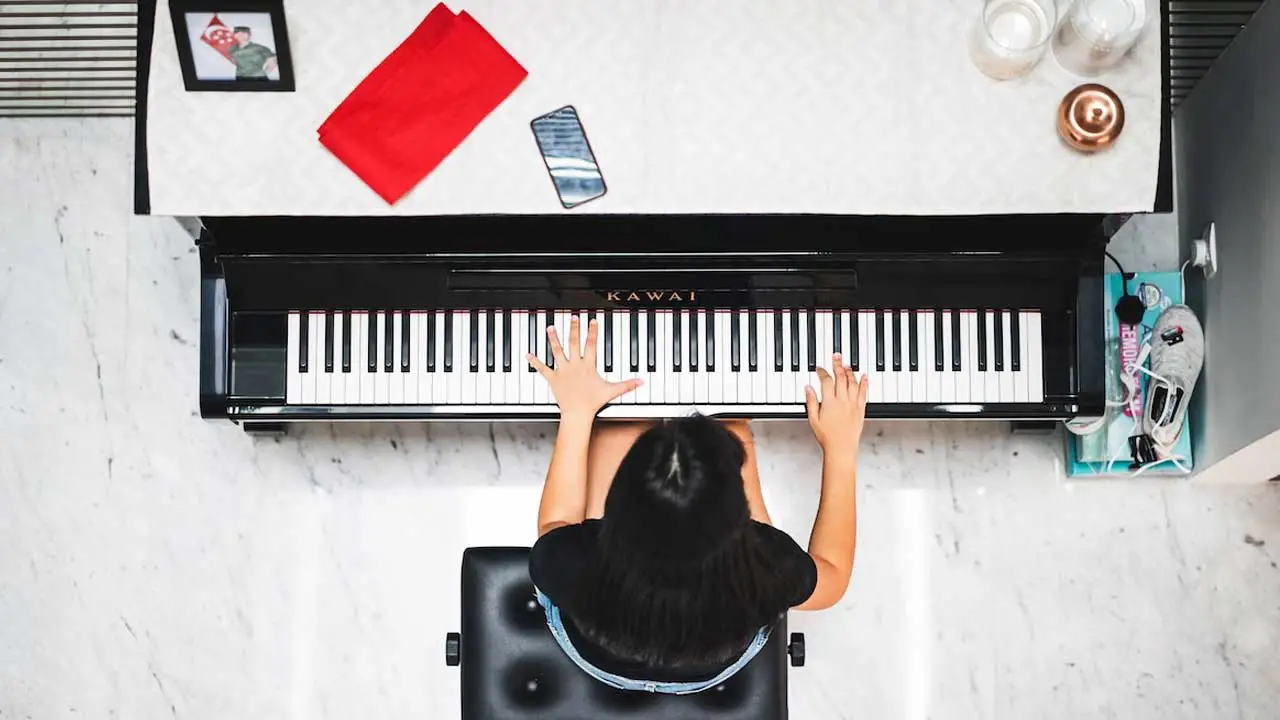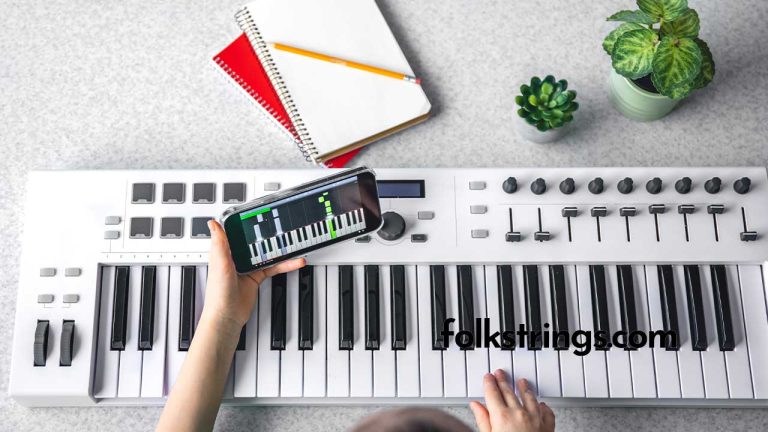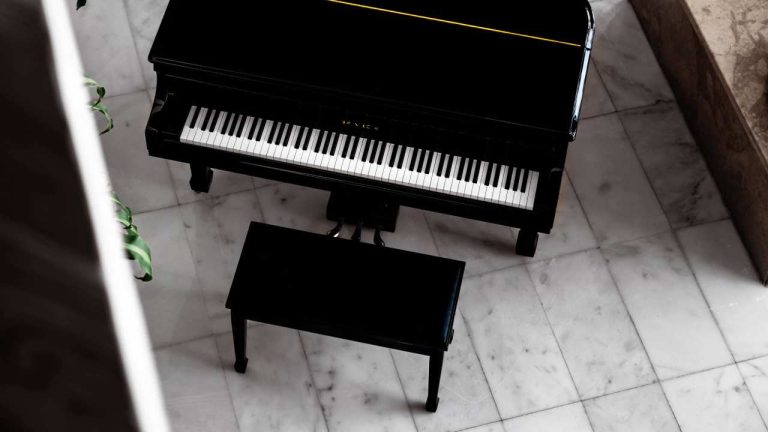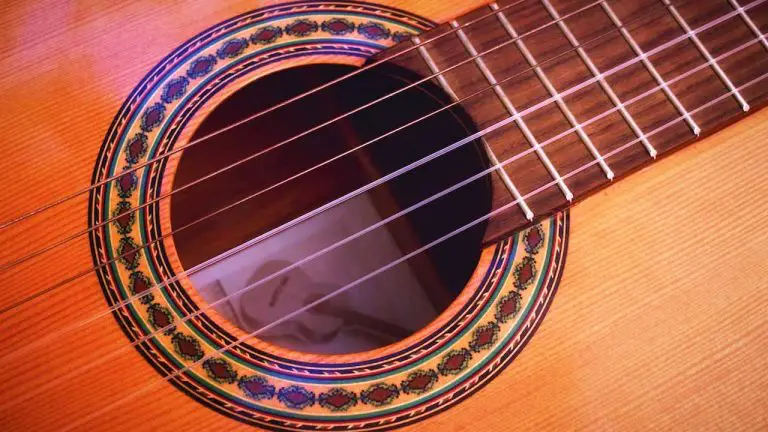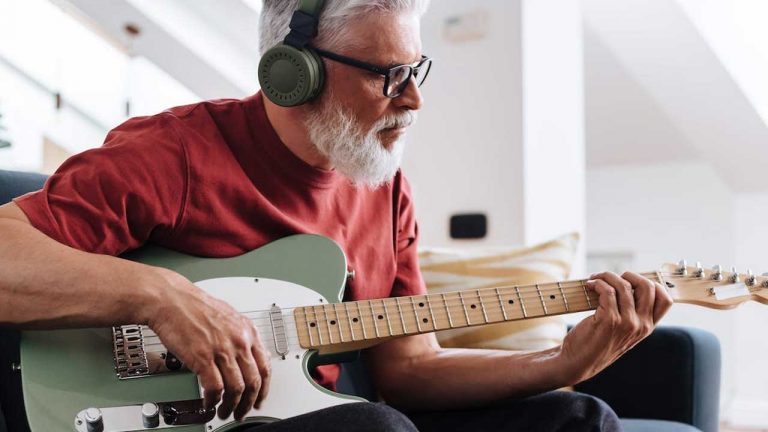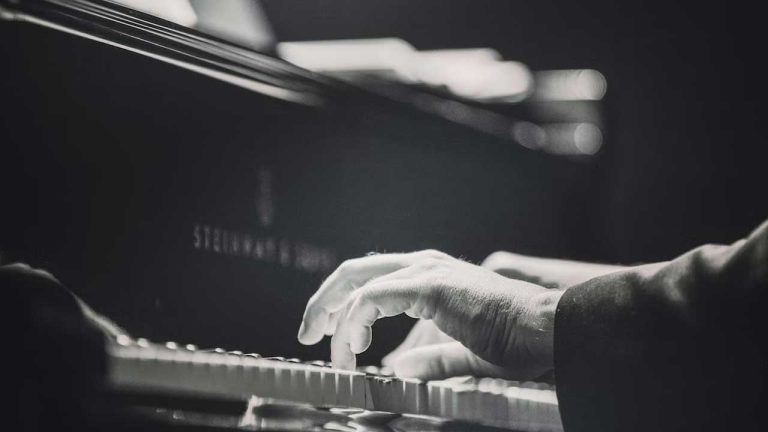How To Play Piano for Beginners: 8 Strategies for Musical Success
Folkstrings.com is reader-supported. When you buy through links on our site, we may earn a small commission.
Embarking on your piano learning journey is an exciting and fulfilling experience. With a wealth of methods to choose from, it’s crucial to find the one that resonates with your personal goals and learning style. In this ultimate guide, we delve into seven comprehensive strategies to learn piano, ensuring you reach your full musical potential.
Table of Contents
1. Traditional Piano Lessons: Building a Solid Foundation
In-Person Instruction: The Gold Standard
Beginners can benefit greatly from private piano lessons. An experienced teacher provides personalized guidance tailored to your needs. They can quickly assess your strengths and weaknesses and help you prioritize what you need to work on.
Beginners need immediate feedback, which in-person lessons provide. This real-time feedback prevents you from developing bad habits that will slow your progress.
Face-to-face lessons allow students to learn music theory and sight-reading. To ensure a well-rounded musical education, a skilled teacher will introduce these essential concepts in a structured and easy-to-understand manner.
Regular lessons with a teacher create accountability and motivation. Knowing you’ll meet with your instructor regularly motivates you to practice and progress.
Recitals and ensemble playing are common in face-to-face piano lessons. These experiences can boost your confidence, musicality, and expressiveness as a performer.

How to Find a Good Piano Teacher
- Research their qualifications: Look for a teacher with formal music education, teaching experience, or a strong performance background.
- Ask for recommendations: Reach out to friends, family, or local music stores to see if they can recommend a piano teacher.
- Check their expertise: Find a teacher who specializes in your preferred style or genre, be it classical, jazz, or pop.
- Consider their teaching approach: Look for a teacher who is patient, adaptable, and able to tailor lessons to your needs and goals.
- Schedule a trial lesson: Before committing, arrange a trial lesson to see if you’re comfortable with the teacher’s style and personality.
- Inquire about recitals and performance opportunities: A good teacher will often provide chances for students to showcase their progress and gain performance experience.
- Ensure logistical compatibility: Make sure the teacher’s location, availability, and scheduling flexibility align with your preferences.
- Discuss rates and policies: Clarify lesson fees, payment terms, and cancellation policies upfront to avoid any misunderstandings later.
2. Online Piano Lessons: Convenience and Flexibility
The Digital Revolution in Piano Education
The rise of online piano lessons offers an unprecedented level of convenience and flexibility. With access to countless courses, tutorials, and video lessons, you can learn at your own pace, regardless of your location.
Top Online Piano Courses to Elevate Your Skills
Some of the best online piano courses include:
Live Online Lessons: A Virtual Classroom Experience
Platforms like Lessonface (coupon code FOLKSTIRNGS15 for $15 off your first order) provide live online piano lessons with professional instructors, offering the benefits of traditional lessons combined with the convenience of digital learning.
3. Mobile Piano Apps: Practice and Learn on the Go
Harnessing Technology for Musical Progress
Mobile piano apps provide an interactive learning experience and the ability to practice anytime, anywhere. With features like real-time feedback and progress tracking, these apps can supplement your piano education and help you refine your skills.
Top Piano Apps to Elevate Your Practice
Some highly-rated piano apps include:
4. Self-Learning with Books and Sheet Music: The Independent Approach
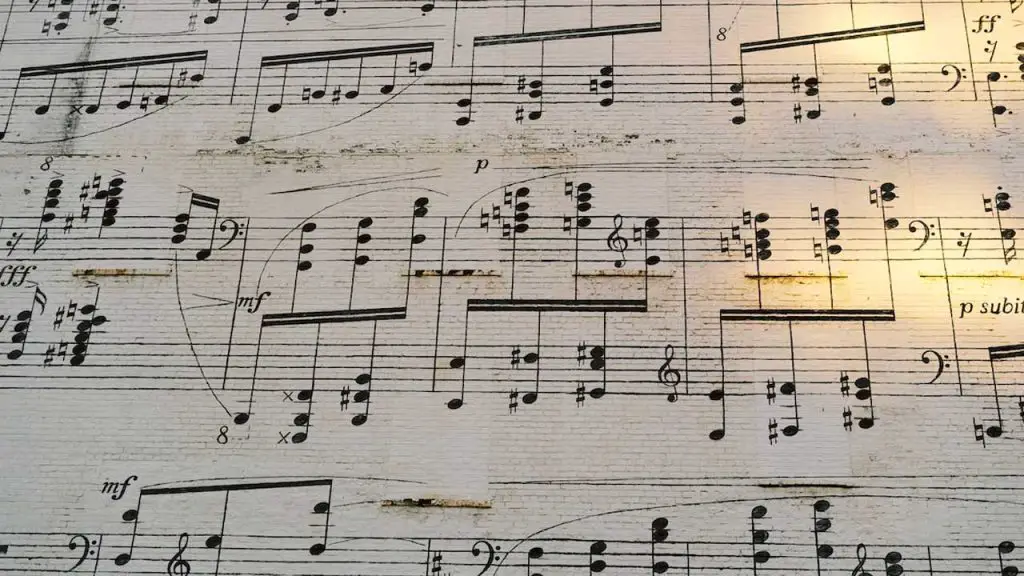
Embrace Autodidacticism
For those who prefer to learn at their own pace and control their learning experience, self-learning with piano books and sheet music is a cost-effective and more empowering option. This method allows you to tailor your learning journey to your interests and goals.
- Structured approach: Piano books often follow a progressive sequence, guiding you through essential concepts and techniques in a logical order. This helps you build a solid foundation and prevents you from feeling overwhelmed.
- Cost-effective: Compared to lessons with a teacher, using books to learn piano is a more budget-friendly option, making it accessible to a wider range of learners.
- Self-paced learning: When learning from a book, you can progress at your own pace, spending more time on challenging concepts and moving quickly through familiar material. This level of control allows you to tailor your learning experience to your needs.
- Flexible practice schedule: Without the need to coordinate with a teacher, you can practice whenever it suits you, fitting your piano sessions around your daily routine.
- Wide variety of materials: There’s an abundance of piano books available, covering diverse topics like technique, music theory, and repertoire. You can choose books that align with your interests and goals, creating a personalized learning journey.
- Independence: Learning piano through books encourages you to develop problem-solving skills and self-reliance, as you’ll need to figure things out on your own. This can be an empowering and rewarding experience.
Essential Piano Books for Every Self-Learner
Some indispensable piano books for self-learners include:
- Piano Book for Adult Beginners
- Alfred’s Basic Adult All-In-One Piano Course
- How to Play Piano in 14 Days
5. Learning by Ear: Develop Your Musical Intuition
Listen, Internalize, and Play
Your ability to pick up melodies, harmonies, and chord progressions without having to rely on written music can be improved by learning to play the piano by ear. This can also help you improve your listening skills.
Those who are interested in popular music, improvisation, or providing accompaniment for singers will find that this method is especially helpful.
Tips for Mastering Piano by Ear
To hone your ability to play the piano by ear, try these strategies:
- Listen actively: To develop your ear, spend time actively listening to music. Focus on different elements, such as melody, harmony, and rhythm. Try to identify chord progressions, intervals, and patterns within the music.
- Start with simple songs: Begin your ear training with familiar and straightforward songs. This will help you build confidence and improve your ability to pick up melodies and chords by ear before moving on to more complex pieces.
- Break the music into sections: Instead of trying to learn an entire song at once, break it down into smaller sections or phrases. Work on each part individually, and once you’ve mastered each section, piece them together to form the complete song.
- Practice intervals and chord recognition: Spend time at the piano working on identifying and playing various intervals and chords by ear. This skill will be invaluable when trying to figure out songs without sheet music.
- Sing along: Singing the melody or even the harmonies while you play can help you internalize the music and improve your ear. This also trains your brain to make connections between the sounds you hear and the notes you play on the piano.
6. YouTube Tutorials: Learn from the Pros at No Cost
A Treasure Trove of Piano Knowledge
YouTube is home to a wealth of piano tutorials from skilled musicians, covering diverse styles and skill levels. These free tutorials can supplement other learning methods or serve as a starting point for those on a budget.
Top YouTube Channels to Boost Your Piano Skills
Some of the best YouTube channels for learning piano include:
7. Join a Piano Community or Group: Connect, Share, and Grow
Support and Inspiration from Fellow Learners
Becoming part of a piano community or group offers a valuable support network that keeps you motivated and inspired. Sharing your progress, discussing challenges, and exchanging tips with other learners enriches your learning experience and fosters a sense of camaraderie.
Piano Communities to Enhance Your Journey
Some popular piano communities and groups to consider include:
8. Regular Practice: The Key to Piano Success
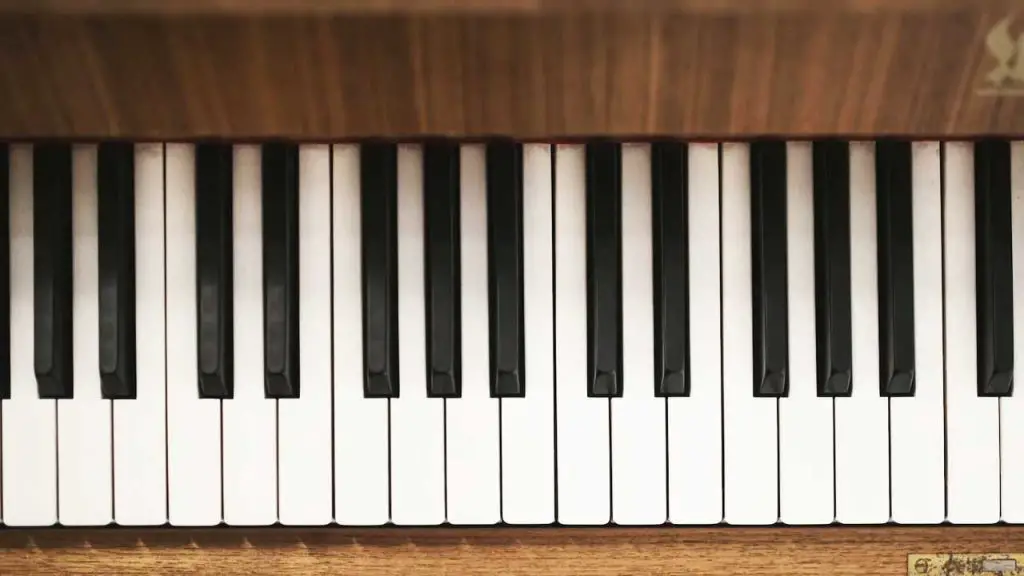
Consistency is King
Regardless of the method you choose, regular and focused practice is essential for success on the piano. Establishing a consistent practice routine and setting clear goals helps you stay motivated and ensures steady progress.
Tips for Effective Piano Practice
To make the most of your practice sessions, keep these tips in mind:
- Warm up with scales, arpeggios, and technical exercises
- Break down challenging passages and practice them slowly
- Use a metronome to develop a steady sense of rhythm
- Set specific goals for each practice session
- Review and reinforce previous material regularly
With these ten comprehensive strategies, you have a wealth of options to explore and customize your piano learning journey. By combining the methods that resonate with you and dedicating yourself to consistent practice, you’ll be on the path to piano mastery and unlocking your full musical potential. Embrace the adventure and enjoy the rewards that come with becoming a skilled pianist.
Author Profile
-
Daniel Johnstone is an English writer with a love for stringed instruments from around the world.
He shares his love for these instruments through his writing for folkstrings.com, a website dedicated to all things related to folk string music.
Daniel's passion for music started at a young age, and he has since become an accomplished musician, playing guitar, cavaco, and recently, the harp.
His dedication to learning and sharing his knowledge of stringed instruments is evident in his insightful and engaging blog posts. Whether you're a seasoned musician or a beginner, Daniel's writing is sure to inspire and entertain you.
When he's not playing music or writing, you can find Daniel exploring new instruments and seeking out new sounds to share with his readers.
Latest entries
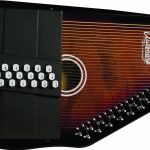 AutoharpApril 4, 2024What Is the Autoharp Made Of: Exploring Its Materials and Craftsmanship
AutoharpApril 4, 2024What Is the Autoharp Made Of: Exploring Its Materials and Craftsmanship AutoharpApril 4, 2024Is Autoharp Easy to Play? Unveiling the Truth for Beginners
AutoharpApril 4, 2024Is Autoharp Easy to Play? Unveiling the Truth for Beginners AutoharpApril 4, 2024What Is an Autoharp Worth? Your Guide to Pricing and Value
AutoharpApril 4, 2024What Is an Autoharp Worth? Your Guide to Pricing and Value AutoharpApril 4, 2024Are Autoharp and Zither the Same Thing? Unraveling String Instrument Myths
AutoharpApril 4, 2024Are Autoharp and Zither the Same Thing? Unraveling String Instrument Myths
Affiliates:
This post may contain affiliate links that at no additional cost to you, the site may earn a small commission. We only recommend products we would use ourselves and all opinions expressed on this site are our own.
Accuracy Advice:
While we strive to provide up-to-date and accurate information, the content in this article may not reflect the most current research or medical guidelines. We encourage readers to do further research and consult with professionals for more personalized advice.
Our Recommendations:
The products and services mentioned in any of our articles are recommended based on our independent research and personal experience. We are not sponsored by any company. We aim to suggest products and services we believe are of high quality and could be beneficial to our readers.

